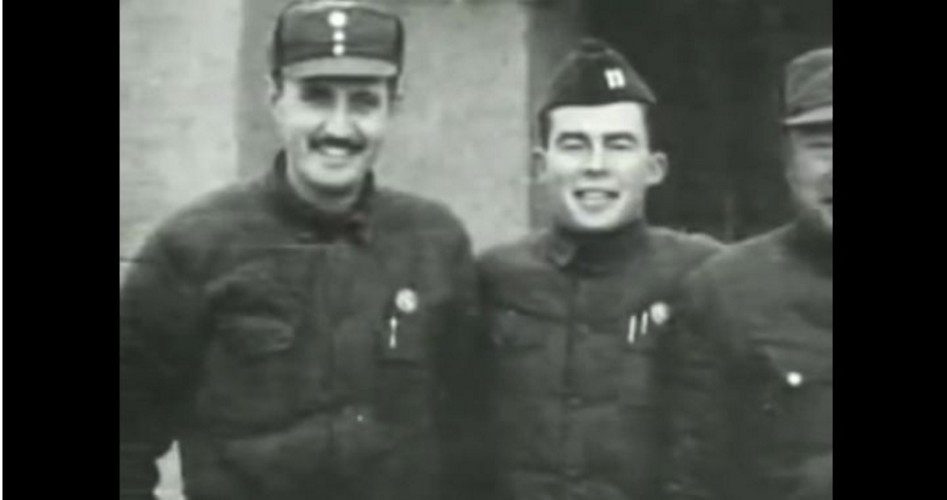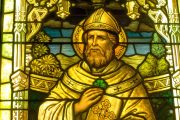
In a recent interview, the Council on Foreign Relations (CFR) discussed the life of John Birch (shown on right), the Christian missionary and martyr: why he is the namesake of the organization that is the parent company of The New American.
On the “Asia Unbound” podcast for June 10, Terry Lautz, the author of a new biography of John Birch, called John Birch: A Life, spoke about the subject of his latest work. According to a synopsis of the show published by the CFR, Lautz “delves deep into Birch’s story.”
It may be hard for many to believe that the CFR would highlight anything that could possibly praise John Birch in light of the successful efforts over the decades of The John Birch Society to shine light on the insidious nature of the CFR’s influence on the foreign policy of the United States and the deep and wide penetration of its members into the highest offices in the federal government.
Just what is the Council on Foreign Relations? Are they indeed “a secretive organization, the agent of nefarious bankers intent on promoting world government” as one supporter of the group’s policies mockingly says “the right” believes them to be?
Or, alternatively, are they, as the CFR’s apologists insist, a “network of realist thinkers with government experience and serious intellectual attainments”?
In truth, for decades since its creation, the Council on Foreign Relations has been the “mother ship” of the internationalist establishment and the source of marching orders for the successive State Departments.
Perhaps the best evidence of the influence of this organization was revealed during a speech delivered at CFR headquarters in New York City in 2009, by then-Secretary of State Hillary Clinton. In her remarks, Clinton offered an accurate and chilling assessment of the relationship between the CFR and American foreign policymakers:
I am delighted to be here in these new headquarters. I have been often to, I guess, the mother ship in New York City, but it’s good to have an outpost of the Council right here down the street from the State Department.
We get a lot of advice from the Council, so this will mean I won’t have as far to go to be told what we should be doing and how we should think about the future.
How prevalent have members of the CFR been in the highest ranks of American politics?
The administrations of every president since Franklin D. Roosevelt have been filled with members of the CFR. From Cabinet-level secretaries to the lowest-ranking sub-bureaucrat, presidents have turned to the CFR as the in-house personnel pool.
This path has been faithfully followed by every president — Republican or Democrat — including Barack Obama.
With that in mind, the interview conducted by the CFR with Lautz about the life and death of John Birch may take on a new tone, rather than one of simple scholarly curiosity.
When asked why a “lifelong scholar and historian” would write a biography of John Birch, Lautz responds that it was “an accident,” explaining that he “stumbled on the story.”
That one would need to stumble on the story of John Birch seems odd given the prominent profile of The John Birch Society. For almost 60 years, The John Birch Society has been extraordinarily active in the effort to restore constitutional liberty to our country and to reign in the federal beast that has run amok.
Lautz then informs the interviewer that “most Americans think John Birch was a right-wing anti-communist” due to his name’s adoption by The John Birch Society.
Why does The John Birch Society bear the name of this soldier and missionary? JBS founder Robert Welch answers this question in his own biography of Birch published in 1954 entitled, The Life of John Birch. Welch wrote:
The young man I admire most of all those America has produced was a fundamentalist Baptist missionary named John Birch. My own obsession with this fight against the increasing forces of evil in the world, which … has caused me to give up business career and income and any prospect of ever having any peace or leisure again during my lifetime, is due in large part to my admiration for John Birch; to my feeling that I simply had to pick up and carry, to the utmost of my ability and energy, the torch of a humane righteousness which he was carrying so well and so faithfully when the Communists struck him down.
The jbs.org website explains more about the Society’s namesake.
John Birch worked hard to serve God, family, and country. As a solo missionary in China, he brought God’s Word to remote villages. During WWII, John risked his life to rescue American prisoners and pilots, volunteered for spy missions, and transmitted enemy locations to Allied Forces. As a guiding strength to others, he never lost faith. Tragically, he was murdered by Chinese Communists 10 days after the war ended. John was only 27.
Robert Welch relates how before naming the organization, he asked Birch’s parents’ permission, which they graciously granted. The two then became life members of the organization named for their heroic and righteous son.
Later in the interview, after detailing Birch’s alleged status as a “heartthrob,” Lautz relates how Robert Welch came to hold John Birch in such high esteem.
In responding to the question, “Who was Bob Welch,” Lautz says, “Welch was a very successful businessman, he had worked for his brother’s candy company…. He then got interested in politics … and decided to establish an advocacy group…. The John Birch Society, a very successful grassroots organization.”
That’s high praise from someone seated at a microphone owned by the CFR!
Next, Lautz describes how The John Birch Society “became so popular.”
“I think it had to do with the effectiveness of the organization,” he said. “I think it was also successful because middle class Americans … liked the idea of being able to do something, being able to make a statement, make a commitment, being able to learn … about the issues of the day from the perspective of the anti-communist Birch Society,” he added.
Lautz’s view of the effective organization of The John Birch Society in its early years is still accurate today. With chapters throughout the country, Americans committed to returning our Republic to its constitutional foundation can unite with likeminded people, pulling together toward the common goal of decreasing the size of government, increasing individual responsibility, and, with God’s help, making America better.
The biographer is right about the information that is available through The John Birch Society, too. Members receive monthly bulletins providing them with research, often exclusive to The John Birch Society, and plans that give right-thinking Americans the weapons they need to combat the ever-advancing forces of statism.
Unfortunately, after praising the organization and education offered exclusively by The John Birch Society, Lautz laments that the JBS is no longer just anti-communist, but is now devoted to “opposition to [the] federal government.”
Is The John Birch Society opposed to the federal government? Not at all. One of the key tenets of the JBS is that it “accepts and endorses the philosophy of liberty and freedom as presented in the Declaration of Independence and the framework of limited government as structured in the Constitution of the United States.”
How, then, could an organization be devoted to restoring the Constitution and against the federal government, considering the latter was created by the former?
No, The John Birch Society, regardless of Professor Lautz’s comment, is not opposed to the federal government; The John Birch Society is opposed to a federal government that acts outside its constitutionally enumerated powers. The Society believes that “the current size of the federal government must be greatly reduced to fall within its constitutional limitations.”
Finally, Lautz describes The John Birch Society’s support for states’ rights. He rightly says that the JBS wants the federal government “off our backs and out of our pockets.” This is certainly true and one way — the most effective way — to force the federal government off our backs and out of our pockets is for states to assume their proper role as protectors of individual liberty and the Constitution. States must serve as a barrier, James Madison explained, between an overreaching federal government and the people whose backs and budgets will be broken by the Leviathan if states do not interpose.
Terry Lautz’s John Birch: A Life is out now from Oxford University Press. A person interested in reading a biography from a different perspective, one less informed by the author’s opinions of The John Birch Society, is encouraged to pick up The Life of John Birch by Robert Welch. It is available from the JBS.




